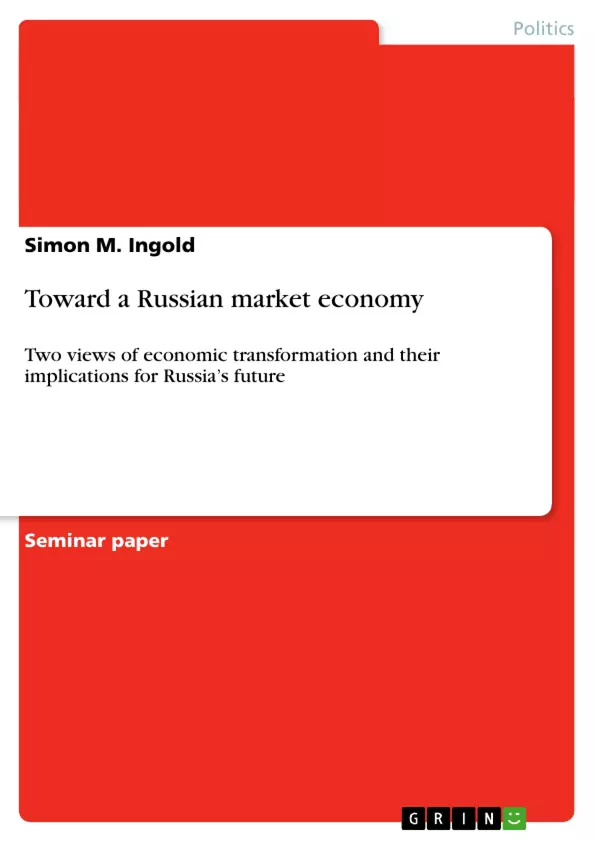The story of the post-Soviet economic transformation of Russia told by radical reform advocates is compelling in the sense that it is cogent within the limited confines of economic logic. However, it is not exhaustive. Rather, it should be regarded as a snapshot view from a very specific – and in particular: an ahistorical – perspective. We will contrast this perspective with an alternative interpretation of reform that takes into account exogenous factors, namely culture and history. As Hedlund suggests, “there are good reasons why economics in particular would be insensitive to the highly specific conditions that marked Russia’s attempted economic transition.” We will begin our remarks with a short overview of the transformation process according to the positivist view of the economist and radical reform advocate Anders Ås-lund. The purpose of the discussion is not to merely recapitulate the chronology of transformation but rather to point out the underlying assumptions on which economic policy rested. These are crucial for understanding why reform deviated from the path forecasted by the proponents of radical reform. In a second step, we will attempt a critical appraisal of theses assumptions and look at some of the adverse implications that followed from them. Third, a different interpretation of the transformation process will be introduced that puts path dependence at the center of analysis, putting the approach taken by radical reformers in a different light. Finally, as a concluding remark, we will briefly go into the practical consequences as implied by the two different approaches regarding the strength and stability of the Russian Federation, the prospects for liberal democracy, and the prospects for an effective market economy.
Inhaltsverzeichnis (Table of Contents)
- Introduction
- Russian transformation
- a positivist view
- Shock therapy and the fear of partial reform
- Partial reform and its deeper origins: the weight of history
- Conclusion: Russia's prospects for the future
Zielsetzung und Themenschwerpunkte (Objectives and Key Themes)
The paper examines the transformation of the Soviet economy into a market economy in post-Soviet Russia. The author seeks to analyze the assumptions underlying the reform process and compare different perspectives on its effectiveness and implications for Russia's future.
- The challenges of transforming the Soviet economy into a market system.
- The role of ideology and historical context in shaping economic reforms.
- The contrasting views of radical reform advocates and path dependence theorists on the transformation process.
- The unintended consequences and potential pitfalls of radical economic reform.
- The implications of different reform approaches for Russia's political and economic stability.
Zusammenfassung der Kapitel (Chapter Summaries)
The introductory chapter sets the stage by outlining the daunting task of transforming the Soviet economy into a market economy, highlighting the complexities and challenges inherent in this endeavor. It introduces two contrasting perspectives on the transformation process – one based on a positivist view of economic reform and the other emphasizing the role of historical factors and cultural influences. The chapter concludes by outlining the key questions that will be explored in subsequent sections.
The second chapter provides a detailed account of the transformation process from the perspective of radical reform advocates, focusing on the economic policies implemented by Boris Yeltsin and his team of reformers. It examines the motivations behind these policies, the assumptions underpinning them, and the perceived necessity for a clean break with the Soviet past.
The third chapter critically appraises the assumptions of radical reform, analyzing the unintended consequences and potential flaws of this approach. It explores the limitations of purely economic solutions in addressing complex socio-political issues and raises questions about the feasibility of building a functioning market economy in Russia.
The fourth chapter introduces an alternative interpretation of the transformation process that emphasizes the importance of historical context and path dependence. This chapter highlights the role of cultural and historical factors in shaping economic outcomes and challenges the assumptions of radical reform advocates. It argues that neglecting these factors can lead to unintended consequences and a failure to achieve sustainable economic growth.
Schlüsselwörter (Keywords)
Key terms and concepts discussed in this work include economic transformation, market economy, radical reform, path dependence, Soviet legacy, Russian history, privatization, institution building, social unity, predatory capitalism, and the role of culture and ideology in shaping economic outcomes.
Frequently Asked Questions
What is "Shock Therapy" in the Russian context?
It refers to the radical and rapid economic reforms implemented in the early 1990s to transition Russia from a planned economy to a market economy.
Why did radical reforms in Russia deviate from expectations?
Reforms often ignored exogenous factors like culture, history, and the institutional legacy of the Soviet Union, leading to unintended consequences.
What is path dependence theory?
It suggests that historical decisions and cultural developments limit future options, making it difficult to simply "import" a Western market model.
What was the positivist view of Anders Åslund?
Åslund advocated for radical, fast-paced reforms, believing that economic logic alone would suffice to create a functioning market system.
What are the prospects for a liberal democracy in Russia according to the text?
The text explores how different reform approaches impacted the stability of the Russian Federation and its ability to establish effective democratic institutions.
- Quote paper
- M.A. Simon M. Ingold (Author), 2006, Toward a Russian market economy, Munich, GRIN Verlag, https://www.grin.com/document/83100



